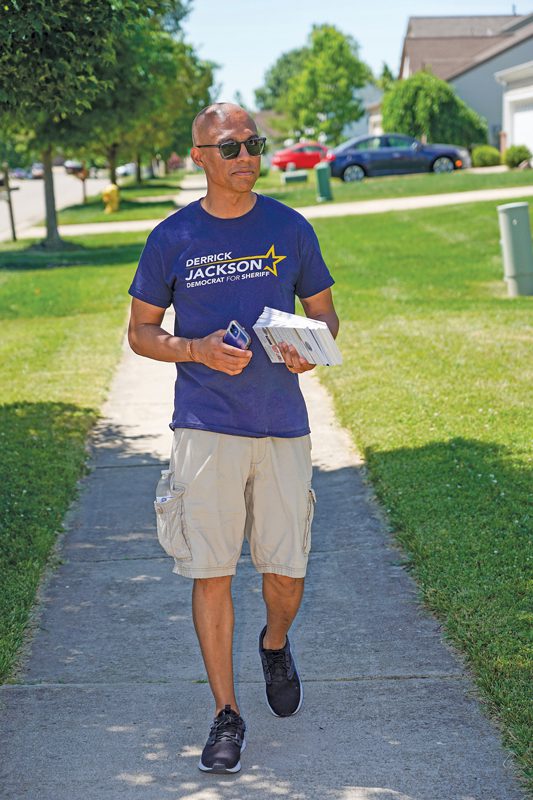Washtenaw County sheriff Jerry Clayton is retiring after four terms. Three candidates are vying to take his place in the August 6 Democratic primary.
Former deputy Alyshia Dyer criticizes the disproportionate number of Black residents arrested in the county and promises “true systemic change,” including throwing open the department’s top jobs.
Derrick Jackson, Clayton’s director of community engagement, points to steps they’ve already taken to reduce involvement in the criminal justice system and pledges to expand them going forward.
Ken Magee is making his third run for the job, after challenging Clayton as a Republican in 2016 and again in the 2022 Democratic primary. A longtime Drug Enforcement Administration special agent who briefly served as U-M police chief, he stresses his credentials and experience.

Former sheriff’s deputy Alyshia Dyer criticizes the disproportionate number of Black residents arrested in the county and promises “true systemic change,” including throwing open the department’s top jobs. | Photo by J. Adrian Wylie
“I grew up in poverty in Ypsilanti and ran away from home at 17,” Dyer emails. “While I had my struggles and was falsely arrested once as a child, I did not get targeted by our local legal system. After running away from home I was able to get into Washtenaw Community College, and my interactions with the police as a child motivated me to become a police officer to bring more compassionate policing forward.”
Now thirty-four, Dyer joined the sheriff’s office in 2012. After nearly seven years on road patrol, she was a part-time marine deputy for three years while earning her undergrad degree in criminology at EMU. She left in 2022 to run for sheriff and go to grad school at the U-M, where she earned master’s degrees in social work and public policy.
“To my knowledge I am the only progressive candidate who wanted to run for this position,” Dyer says. Her endorsements include county commissioner Yousef Rabhi, WCC trustee Dave DeVarti, former Ann Arbor city council member Kathy Griswold, two current Ypsilanti council members, AFSCME Michigan, and the Huron Valley Area Labor Federation AFL-CIO.
“The current sheriff, who I worked for my whole career, started out implementing change and made a lot of positive changes,” Dyer says. But “over time I think a lot has fallen through the cracks.”
Despite Clayton’s progress, she says, the office’s “status quo is unacceptable.” She points to its Data and Information Dashboard, which shows that Black residents account for 66 percent of their arrests and 69 percent of those subjected to physical force or deploying a weapon. That’s more than five times their representation in the county’s population. “Reducing, and ultimately eliminating, [these] racial disparities will require bold, systemic changes made in collaboration with the communities that are most impacted,” she writes.
She would start by shaking up the office’s leadership. “After winning the primary, I’m going to start a hiring committee,” Dyer says. “My goal is to have everybody that’s currently in upper administration apply, as well as the public apply, for the positions that are going to be opened up.” Dyer mentions finance director, grant director, and undersheriff as possibilities.
Dyer questions whether Jackson is qualified for the sheriff’s job because he has never worked road patrol. Would that be a requirement for the jobs she plans to open up?
“The qualifications for any job description will be determined on a position-by-position basis,” she emails. “It would not make sense to require policing experience for, say, a finance director. However, there are other positions, such as the police services commander, that policing experience would make sense as a qualification.”
She also promises “fundamental changes about how the Sheriff’s Office operates and who it protects. That’s why I will create a Corporate Accountability Crimes Unit that will provide detectives to workers and Unions when their labor rights are violated. It’s also why I’ll enforce environmental laws to hold corporate polluters accountable.”
Dyer is concerned about representation within the department as well. “The sheriff’s office is 87 percent white and predominantly male,” she writes. “We need more representation at every level of the sheriff’s office, and when you hire more people from the community it helps combat that extremely problematic us vs them mindset in law enforcement. These gaps in hiring have perpetuated a very male dominated culture.”
If elected, Dyer would be the county’s first female sheriff.

“Jerry Clayton ran for office [in 2008] to begin changing some of the issues at the sheriff’s office,” says Derrick Jackson, his director of community engagement. “And I’m running for sheriff to continue those changes.” | Photo by J. Adrian Wylie
“Jerry Clayton ran for office [in 2008] to begin changing some of the issues at the sheriff’s office,” Jackson says. “And I’m running for sheriff to continue those changes.”
Jackson, forty-eight, got his master’s in social work from the U-M and started his career at Ozone House—which, he says, “showed me that there were larger issues within the system. And so I left social work to really change larger systems.”
Jackson emails that when Clayton took office in 2009, “[I] made my way to the Sheriff’s Office thinking about the impact that public safety had on my community as a kid.” His childhood in Inkster is “the number-one reason why I’m running for sheriff, honestly.”
The city was “hyper-violent and our relationship with the police was horrible,” he says. “I remember what it was like to have the police roll up, sit you on the curb, and question you simply because of where
I lived.”
Things are better here, Jackson says, and he credits Clayton. He says the retiring sheriff has done a “phenomenal job” at building something “pretty spectacular” in Washtenaw County.
“When I started this work, we didn’t invest a single dollar into alternatives to incarceration, diversion, deflection, reentry [after imprisonment]. We now invest a little over $4.7 million a year” in programs to keep people out of the criminal justice system.
Jackson agrees that Black residents are overrepresented in the department’s interactions, but not to the extent that Dyer’s data suggests, because “our patrol area is not the entire county. Ypsilanti Township is our largest contracting area where we spend the majority of our patrol time and which happens to be one of our most diverse population areas.”
In the 2020 census, 31.4 percent of Ypsilanti township residents identified as Black, compared to 12 percent countywide. Adjusting for that, the department’s data show a smaller but still significant disparity. Jackson says that in 2023 there were 1,420 arrests in Ypsilanti Township, which has a population of 54,585. This works out to 2.6 arrests per 1,000 residents. But the rate for Black residents was more than three times higher than for White residents: 5.65 percent vs. 1.45 percent.
“Black folks in Ypsilanti Township are more likely to be arrested,” Jackson confirms. “But then the questions become why.”
He believes that “some of it does have to do with policing tactics, which is why we’ve implemented diversion programs like LEADD” (Law Enforcement Assisted Diversion and Deflection). The program aims to minimize troubled residents’ interaction with the court system.
When deputies responding to a minor infraction recognize the offender as someone known “to have challenges with mental health, addiction, or extreme poverty,” Jackson says, instead of making an arrest, they “must refer that person to the LEADD case managers so they get the services they truly need.”
As sheriff, he says, he’d continue to “move more resources further upstream” from the legal system. “I often tell people that the job isn’t done. We’ve got to something different, something bigger, something bolder in Washtenaw County.”
He calls it “transformational reform,” and says his goal as sheriff will be “to change neighborhoods and systems around our community so we don’t have to rely on policing to solve these symptoms.”
While the sheriff’s office has “accountability measures in place,” he says, “I have a big transparency initiative that is very similar to what prosecutor Eli Savit has done on the prosecutor’s level.” Dyer has a similar plan, and Magee, too, is calling for greater transparency, so whoever wins, change here seems certain.
Like Dyer, Jackson launched his campaign in 2022 after Clayton announced he wouldn’t run again. He’s endorsed by Clayton and Savit, eight of the nine county commissioners, state senators Jeff Irwin and Sue Shink, state representatives Jason Morgan and Felicia Brabec, and the mayors of Ann Arbor, Ypsilanti, and Saline.

Magee has no endorsements from local elected officials but many from former law-enforcement colleagues. And he has campaign signs up all over the county. | Photo by J. Adrian Wylie
In addition to decades in law enforcement, Ken Magee has bachelor’s and master’s degrees in criminal justice from MSU. He got 31 percent of the vote running against Clayton as a Republican in 2016 and 24 percent as a Democrat in 2020. He launched his current campaign last August.
“Both times that I’ve run, it was a learning experience,” Magee says. “What you could do better and what you won’t do again.” The sixty-five-year-old law enforcement consultant says he’s truly a Democrat and only ran as a Republican “to get the experience. I knew I would not win.”
This time, he says, “I plan on winning this election,” in part because “I believe that the public is tired of the crime.” His website says he’d reduce violence through aggressive enforcement of gun laws, getting more drug users into treatment, and enhancing services for victims of domestic violence.
Like Dyer, he’d shake up the department’s leadership. “I will get rid of some of the high-paying jobs at the Sheriff’s department [that] are political favors that people have been given,” he says, and “utilize the ineffective positions to enhance the ability to create more FOIA coordinators” to respond to Freedom of Information Act requests.
Magee has no endorsements from local elected officials but many from former law-enforcement colleagues. And he has campaign signs up all over the county.
They say “Vote For Sheriff Vote For Magee,” but the “Vote fors” are so small that from any distance they seem to say “Sheriff Magee”—as if he is already sheriff.
“It’s marketing,” Magee explains. “What are the two most important words there? My name and the office.”